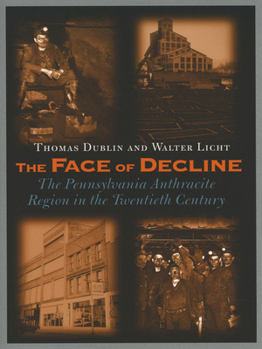The Face of Decline: The Pennsylvania Anthracite Region in the Twentieth Century
Select Format
Select Condition 
Book Overview
The anthracite coal region of Pennsylvania once prospered. Today, very little mining or industry remains, although residents have made valiant efforts to restore the fabric of their communities. In The Face of Decline, the noted historians Thomas Dublin and Walter Licht offer a sweeping history of this area over the course of the twentieth century. Combining business, labor, social, political, and environmental history, Dublin and Licht...
Format:Paperback
Language:English
ISBN:0801484731
ISBN13:9780801484735
Release Date:December 2005
Publisher:Cornell University Press
Length:288 Pages
Weight:1.40 lbs.
Dimensions:0.7" x 7.0" x 10.0"
Age Range:18 years and up
Grade Range:Postsecondary and higher
Customer Reviews
1 rating
A Top Notch Book About Decline
Published by Thriftbooks.com User , 16 years ago
This book is a well-researched and very gripping analysis of the history of the decline of Pennsylvania's anthracite industry. This tells of the events creating this industrial giant. It then details the circumstances that destroyed this once financial dynasty. Pennsylvania was once a leading input towards our nation's economic strength. It's approximately 500 square miles of anthracite coal, which is 95% of the world's known supply, accounted for 16% of American's energy needs during the industrial era of the 1890s. The demands for increased energy during the 1910s due to World War I kept demand for Pennsylvania anthracite thriving. Yet, after the war, people turned to lower cost alternatives, such as oil and gas. Anthracite over time has found it increasingly difficult to compete. In 1917, Pennsylvania saw 100 million tons of anthracite was extracted by 181,000 miners. In 2000, less than 1,000 miners produced 4 million tons. With the decline of industry came the decline of coal communities. This is a region that has gone from almost 1.2 residents in the 1930s to 836,000 today. This is more stunning compared to the population boom throughout most of the rest of the country. As the authors note, these towns have more than the typical share of abandoned commercial sites, elderly, and people requiring public assistance as the only available income option. As the Depression of the 1930s forced many mine investors to close their companies, unemployed miners still wanted jobs to feed themselves and their families. They created "bootleg" companies and continued mining, up to 5 million tons in 1939, without authority of the owners. This led to a period of literal mine wars, where armed labor protectors would do battle with armed mine police. Governor Gifford Pinchot responded by declining to send in state police officers as mine owners requested. World War II produced increased energy demands, and many mines officially reopened. Unfortunately, many mine owners, many absentee investors and many often operating in partnership with union officials, liquidated and diversified mine assets in ways that was profitable during wartime, yet financially crashed upon peacetime. Several public redevelopment projects attempted to stem the economic collapse of this region, yet the projects were haphazard with no overall plan. They may have helped stem some losses, yet they failed to resolve the larger challenges as the area was thrown into a downwards cycle, according to the authors. The Pennsylvania state legislature played interesting roles in this history. A key issue has always been the transportation of all this coal. At first, it was legislated that coal and rail interests be kept separate, and that no transporting company could own a mine. Railroad companies hired lobbyists who, in 1860, persuaded the legislature to end this ban. What resulted was investors, in particular J.P. Morgan, owning both rail companies and coal mines. Coal




